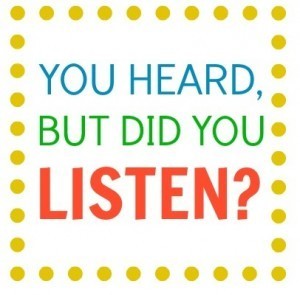 We are in a world that is always talking. On the phone, at the office, over lunch – conversations occur with or without our participation. And we hear the continuous buzz of human voices along with barking dogs, meowing cats, screeching busses and beeping iPhones. There are so many sounds that we cannot help but hear because hearing, function of the ear, one of our five senses, happens with or without our consent.
We are in a world that is always talking. On the phone, at the office, over lunch – conversations occur with or without our participation. And we hear the continuous buzz of human voices along with barking dogs, meowing cats, screeching busses and beeping iPhones. There are so many sounds that we cannot help but hear because hearing, function of the ear, one of our five senses, happens with or without our consent.
On the other hand, listening is an act that we all choose to do. Listening occurs in discussing a career move with a mentor, talking to our children, when closing a business deal, and when a particular piece of music is to our liking. Listening happens because we are actively processing the information exchanged at that moment.
It is important to note that hearing does not equal listening since hearing is involuntary while listening is a conscious choice. Choosing to listen nurtures positive traits:
- Listeners are patient. We’ve all heard it, “Patience is a virtue,” never more so in a conversation and discussion. Many of us begin to formulate a reply in our heads while a topic is being presented. We must learn to keep our minds from creating replies as the other party expounds and finishes expressing their thoughts.
- Listeners are respectful. Showing respect comes in many forms one of which is allowing somebody to finish a sentence. A listener values and understands the words and emotions of peers and colleagues evidenced by the time invested in listening to them.
- Listeners can empathize. They are able to put themselves in the other person or group’s situation, understand better the reasons for the changes in behavior. For example, management might implement strict policy about tardiness. Staff who can empathize will understand that in being late productivity time is wasted. A change in behavior may show that staff were listening, comprehending that tardiness affects the business’ bottom line.
Listening is an acquired skill. With time and persistence, it can be learned. We will, perhaps, know that we are learning when family, friends, and colleagues begin coming to us to become their sounding boards. The best proof would be an improvement in company workflow and productivity proving that staff listens to management.
Written by Yoli P. – The Help